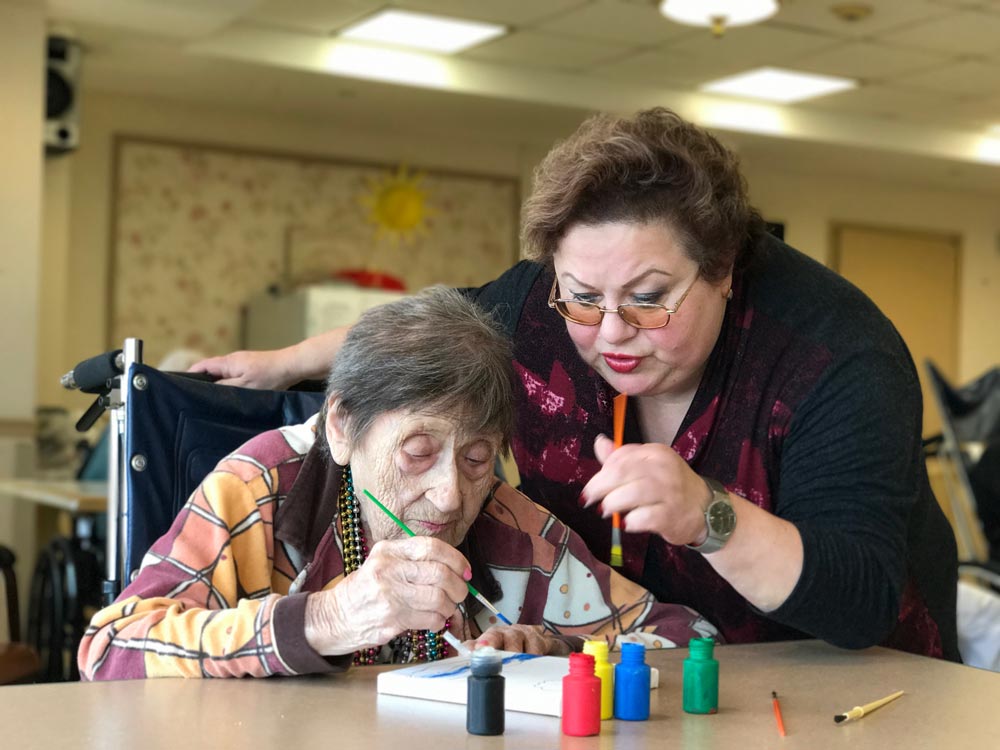Reliable Dementia Care Techniques for a Better Top Quality of Life
In the world of mental deterioration treatment, the implementation of effective strategies is essential for improving the quality of life for both individuals affected by the disease and their caretakers. Recognizing the distinctive stages of dementia permits tailored interventions that address the advancing needs of clients-- from promoting cognitive interaction in the onset to guaranteeing self-respect in late-stage treatment. In addition, the significance of interaction techniques and a supportive atmosphere can not be overstated. What particular approaches can be embraced to cultivate an ambience of concern and link throughout this challenging trip?
Comprehending Dementia Phases

In the beginning, individuals may experience moderate amnesia and problem with acquainted tasks. Treatment techniques should focus on maintaining self-reliance and offering cognitive stimulation. The middle phase is characterized by raised complication, problem recognizing loved ones, and impaired judgment. Throughout this phase, caregivers ought to implement organized routines and make sure a safe environment. Lastly, in the late stage, people might shed the capability to communicate and need aid with everyday activities. Right here, thoughtful care is necessary, highlighting convenience and dignity.
Acknowledging these phases enables caretakers to adapt their strategies and supply assistance that aligns with the person's existing demands, eventually helping with far better monitoring of the problem and boosting the total caregiving experience. Understanding mental deterioration phases is consequently a fundamental aspect of efficient mental deterioration treatment.
Interaction Methods
Efficient interaction is an essential component of mental deterioration care, especially as the disease progresses with its various phases. As cognitive capacities decrease, it becomes important to adapt interaction strategies to fulfill the needs of individuals with mental deterioration. Utilizing clear, easy language is vital; caretakers need to avoid intricate sentences and lingo, opting rather for uncomplicated, succinct expressions.
Non-verbal communication plays an equally considerable role. Face expressions, motions, and intonation can convey heat and understanding, frequently improving verbal messages. Maintaining eye contact and an open stance cultivates a feeling of connection and safety, encouraging individuals with dementia to involve even more totally in discussions.
It is additionally advantageous to hold your horses and permit enough time for feedbacks. Individuals might need extra time to procedure details and create their thoughts. If comprehension appears doing not have., duplicating or rewording concerns might be required.
Finally, concentrating on the person's rate of interests and individual background can assist in more purposeful interactions. Participating in familiar subjects can evoke positive memories and feelings, further improving the interaction experience (memory care facilities charlotte). By using these methods, caregivers can dramatically improve the quality of interactions, advertising dignity and regard for individuals coping with mental deterioration
Producing a Safe Setting
Creating site web a risk-free atmosphere for individuals with mental deterioration is vital to advertising their health and freedom. A properly designed space can significantly lower the dangers of mishaps and improve the high quality of life for those influenced by this problem.
Lighting plays an important function also; using natural light any place feasible and including night lights can assist individuals navigate their surroundings securely. Furthermore, classifying spaces and essential things can assist memory and orientation, lowering confusion and anxiousness.
It is likewise important to develop an acquainted environment by individualizing the area with photographs or cherished products, which can stimulate positive memories and a feeling of belonging.
Integrating furnishings that is both useful and comfy adds to an encouraging environment, permitting individuals to take part in daily tasks with simplicity. Ultimately, a safe environment not only safeguards versus physical risks however likewise cultivates a feeling of protection, which is vital for the psychological well-being of those living with dementia.
Engaging Routines and tasks
Involving activities and structured routines are crucial components in the treatment of individuals with mental deterioration, as they promote cognitive feature, emotional security, and social interaction. These tasks need to be customized to the individual's passions, abilities, and stage of cognitive decline. dementia care charlotte. Simple, repetitive jobs such as horticulture, arts and crafts, or food preparation can give significant interaction, allowing individuals to use their abilities while promoting a sense of success
Establishing an everyday regimen helps produce a foreseeable setting, which can decrease anxiety and complication. This structure can include assigned times for meals, tasks, and rest, making certain a balanced method to daily life. Integrating social communications right into these regimens, such as group activities or seeing family, additional enhances emotional well-being and deals with feelings of isolation.
In addition, physical tasks, such as walking or dancing, not just advertise physical wellness yet also boost psychological interaction. Urging involvement in community occasions or support teams can give Check Out Your URL additional possibilities for socialization. Overall, the assimilation of interesting activities and organized regimens is crucial in enhancing the lifestyle for people with dementia, fostering independence and self-respect while resolving their one-of-a-kind demands.
Supporting Caretaker Wellness
Caring for individuals with mental deterioration can be a requiring and emotionally straining experience, making it imperative to prioritize the wellness of caregivers. Caregivers typically encounter high degrees of stress, stress and anxiety, and physical exhaustion, which can result in burnout if not dealt with appropriately. To sustain their wellness, it is important to implement a diverse approach.
First, offering caregivers with accessibility to education and learning and sources can equip them with strategies to manage everyday challenges. Support system, both in-person and online, supply a platform for sharing experiences, fostering a sense of area, and decreasing feelings of seclusion. In addition, reprieve treatment services enable caretakers to take required breaks, allowing them time to participate in and reenergize to their own health and wellness needs.
Furthermore, encouraging caregivers to engage in self-care practices-- such as regular exercise, healthy consuming, and mindfulness-- can dramatically enhance their resilience. Advertising open interaction regarding their sensations and challenges with relative or experts also helps minimize psychological worries.
Final Thought
Finally, effective dementia treatment approaches encompass an extensive understanding of the illness's phases, the execution of clear communication methods, the establishment of a risk-free environment, and the promo of structured routines and appealing activities. Additionally, prioritizing the well-being of caregivers is important to sustaining top quality treatment. By incorporating these approaches, the overall high quality of life for individuals with dementia can be significantly boosted, cultivating a supportive atmosphere that promotes dignity and psychological health.
In the world of dementia care, the application of effective techniques is crucial for improving the quality this of life for both people impacted by the condition and their caretakers. By using these strategies, caregivers can considerably enhance the quality of communications, advertising self-respect and respect for people living with dementia.

Caring for individuals with mental deterioration can be a demanding and mentally exhausting experience, making it imperative to focus on the well-being of caretakers.